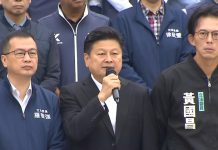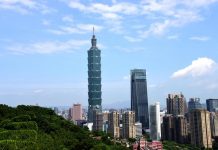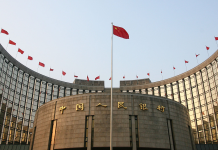
A few key updates regarding China-U.S. economic and trade relations: In June, China’s seaborne container shipments to the United States increased by 15 percent year on year in terms of volume, according to a report by Japanese media company Nikkei on July 22.
U.S.-based research company Descartes Datamyne, specializing in global trade and shipping data, reported that the number of twenty-foot containers, a standard size for shipping containers used in global trade, moved from Asia to the U.S. increased by 16 percent year on year in June, with the Chinese mainland accounting for nearly 60 percent of the total volume.
These findings align with data released by the General Administration of Customs of China on July 12, indicating that China-U.S. trade amounted to 420.94 billion yuan ($57.8 billion) in June, a year-on-year increase of 2.9 percent. China’s exports to the U.S. rose by 4.7 percent on an annual basis, maintaining a positive trend.
Additionally, recent interactions between Chinese and U.S. business communities have been robust. On July 22, a U.S. business delegation led by Board Chair of the U.S.-China Business Council and FedEx President Raj Subramaniam arrived in Beijing. The delegation included top executives from U.S.-based multinationals such as Micron, Goldman Sachs, Apple and Boeing.
From July 27 to August 1, at the invitation of the U.S. side, Ren Hongbin, Chairman of the China Council for the Promotion of International Trade (CCPIT), led a delegation of Chinese business heavyweights to visit the U.S. and attended the U.S.-China Economic and Trade Cooperation Forum in New York City on July 29.
Against a backdrop of uncertainty in the bilateral relationship, the interactions and exchanges between the two business communities have “given a shot in the arm to the future steady and sound development of China-U.S. ties, which is of great significance,” said Sun Lipeng, a researcher with the Institute of American Studies of the China Institutes of Contemporary International Relations.

Ren Hongbin, Chairman of the China Council for the Promotion of International Trade, speaks at the U.S.-China Economic and Trade Cooperation Forum in New York City, the United States, on July 29 (CNSPHOTO)
Reciprocal trips
Members of the U.S. business delegation said the U.S. business community is confident in further deepening cooperation with China and is committed to building a strong and balanced bilateral relationship, Xinhua News Agency reported.
“We appreciate the opportunity to engage with Chinese leaders to promote commercial ties and advocate our priorities for the benefit of our companies and employees,” Subramaniam was quoted as saying in a press release.
“The visit of a large delegation of U.S. businesses to China reflects how many American companies are still hoping to maintain close relations with China, their major trading partner, to better secure their business interests,” He Weiwen, a senior fellow with the Beijing-based think tank Center for China and Globalization, told newspaper Global Times.
During their weeklong visit to the U.S., the 50-strong Chinese delegation undertook extensive exchanges with representatives of the U.S. Department of Commerce, the states of New York and Maryland, the U.S. Chamber of Commerce, the U.S.-China Business Council, and other government departments and agencies, as well as with U.S. companies, according to Ren.
Founded in 1952, the CCPIT works to strengthen the bonds between Chinese and foreign businesses and advance international economic and trade exchanges. The organization moved its representative office, which opened in Maryland in 1988 and had since remained there, to a new location in the U.S. capital of Washington, D.C. on July 30, sharing the same premise with the U.S. Chamber of Commerce.
“The representative office of the CCPIT has served as an important bridge and bond for Chinese and American business activities,” Chinese Ambassador to the U.S. Xie Feng said at a reception to mark the office’s opening at the new site.
Cliff Seagroves, Principal Deputy Director of the Office of Foreign Missions of the U.S. State Department, said he was pleased to see the CCPIT’s new location finally opening in the heart of Washington, D.C. “We’re confident that this space will help bridge the gap between the U.S. and China and strengthen our economic cooperation for both U.S. and Chinese businesses,” he added.
Communication channels between the business communities have always been maintained, Sun said, adding that this serves not only as a “lubricant” for business collaboration but also as a “stabilizer” for China-U.S. relationship.
On issues such as the economic, trade and business policy environment, digital transformation and climate change, both sides have reached positive consensuses and expressed a willingness to further promote cooperation. He explained that this signifies broader prospects in these areas.
“We are encouraged by the efforts to resume bilateral dialogue and cooperation with China,” Declan Daly, Chief Operating Officer with the United States Council for International Business, said at the New York City forum, adding it is time for the U.S. to re-engage with China on the issues of concern and the trade relationship to find negotiated solutions to long-standing disputes.
“Toward that end, we would welcome establishing a regular bilateral dialogue,” Daly said.
Promising potential
“We look forward to achieving concrete outcomes and cultivating new growth drivers through such communication,” Ren told about 300 businesspeople from different industries from both countries at the forum on July 29.
China’s market potential offers huge cooperation opportunities, as it imports $2.5 trillion worth of goods and services annually and is the second largest destination for foreign direct investment worldwide, Huang Ping, Consul General of the Chinese Consulate General in New York, told the forum.
In its latest World Economic Outlook report, released in July, the International Monetary Fund (IMF) raised China’s GDP growth forecast for 2024 to 5 percent, an upward revision of 0.4 percentage points from its April report.
HSBC, a multinational banking and financial services organization, said in an earlier report that it expects China to achieve its annual GDP growth target of around 5 percent, while noting that China’s industrial production and manufacturing investment have become highlights of the nation’s economic activity.
U.S. businesspeople expressed enthusiasm about potential opportunities arising from the strong commercial ties between the U.S. and China.
There is no doubt about the importance of this enormous economic relationship between the U.S and China to his council’s members, Daly said, who collectively represent over $5 trillion in annual revenue and 11.5 million employees.
Jesse Weiner, a co-managing partner at New York-based full-service law firm YK Law LLP, expressed his delight at seeing business deals, investments and trade flourishing, in contrast to the slowdown during the COVID-19 pandemic.
In the first half of this year, the number of U.S. companies investing in China increased by more than 20 percent compared with the same period last year, with actual investment doubling, according to Ren.
Weiner said many U.S. entities, entertainers and influencers wanted to be in China and market their goods and services on Douyin, TikTok’s Chinese sister app, as well as on major Chinese e-commerce platforms such as Tmall.
“Now, there’s more positive cooperation and development among the two countries again. And I just can hope it continues along that trajectory,” Weiner added.
“The reason that we’re here is because I want to meet people who can introduce us into the Chinese infrastructures of [online marketplace] Temu, TikTok and [online fast fashion retailer] Shein,” said Jonathan Webb, co-founder and co-CEO of New York City-based logistics and supply chain management company Packable, Inc.
The U.S. market has a huge appetite for what is being manufactured in China, from selfie sticks to wax warming kits to magnetic puzzles, all the way to electric vehicle (EV) charging stations, Webb said on the forum’s sidelines.
“All those goods are being manufactured in China and brought into the U.S., but everybody is nervous about the tariffs. So we have to figure out how to try to help mitigate those issues,” he told Xinhua.
In May, the U.S. decided to raise additional tariffs on its imports of Chinese products, including EVs, lithium-ion batteries, solar cells, critical minerals, semiconductors, steel and aluminum, and cranes.
On July 30, the U.S. announced that the implementation of increased tariffs on Chinese imports, which was to have taken effect on August 1, would be postponed for at least two weeks.
Webb said he plans to continue to work with Chinese manufacturers as such partnerships are necessary and will shape the future of his business.
Ultimately, working with China creates jobs and economic stimulus in the U.S., which is very important to the local municipalities inside the country, he added.

Supply chain myth
In contrast with the U.S. Government calling for “de-risking,” a disguised form of “decoupling,” from China, He said the U.S. companies are coming in from the perspective of business interest, and economically, they need stable bilateral trade relations.
The two countries’ industrial and supply chains are deeply integrated. Last November, companies from the U.S. sent the most exhibitors of any foreign country to the China International Supply Chain Expo in Beijing, the world’s first national exhibition focusing on supply chains, Ren said.
“China’s involvement in the global supply chain is very, very important,” Webb said.
“In the last several years, we’ve seen a lot of decline in supply chain items… So we want to try to reestablish ways to gain these at affordable prices,” said Robert L. Garland Jr., CEO of Garland & Zhang, LLC, who is working to promote international trade with Indian communities and cooperation between Chinese manufacturers and American retailers.
Unilateralism and economic populism, such as attempts to decouple from China, cut off industrial and supply chains, and put up more trade barriers, “will not make America great again,” Sun said. “Only by strengthening economic and trade cooperation with China, can the U.S. business community find real opportunities,” he added.
“We’re living in the age of small yards and high fences… It’s up to the business communities to move past all the frictions and the challenges and implement what is at the heart and soul of the U.S.-China relationship, which is the people-to-people relationship,” Charles Freeman, Senior Vice President for Asia of the U.S. Chamber of Commerce, said on July 30. The “small yards and high fences” he mentioned refer to actions based on a strategy of the U.S. Government to cut off links between China and the United States in the hi-tech field.
“There is no question in my mind, whenever someone asks, are the United States and China, are we actually going to enter into some real conflict? I say ‘no.’ Because the relationship between people is so strong and so permanent that I think it can overcome [anything],” he concluded. –The Daily Mail-Beijing Review news exchange item





